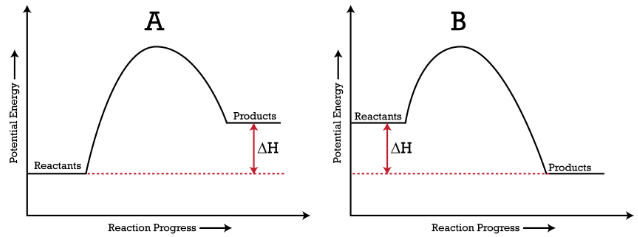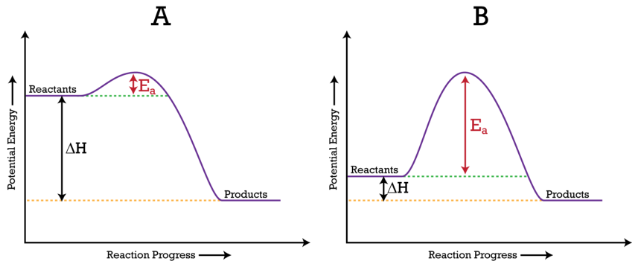How To Draw An Energy Diagram
xviii.4: Potential Energy Diagrams
- Page ID
- 53890
Sisyphus was a mythological being who was a very evil king. Every bit a penalisation for his misdoings, he was supposed to curl a large stone upward to the top of a long colina. A spell had been placed on the rock then that it would roll dorsum down before reaching the top, never to consummate the job. Sisyphus was condemned to an eternity of trying to become to the elevation of the hill, but never succeeding.
Potential Energy Diagrams
The free energy changes that occur during a chemical reaction can be shown in a diagram chosen a potential free energy diagram, or sometimes chosen a reaction progress curve. A potential energy diagram shows the change in potential free energy of a system as reactants are converted into products. The effigy below shows basic potential energy diagrams for an endothermic (A) and an exothermic (B) reaction. Recall that the enthalpy change \(\left( \Delta H \correct)\) is positive for an endothermic reaction and negative for an exothermic reaction. This can be seen in the potential free energy diagrams. The total potential energy of the system increases for the endothermic reaction as the organization absorbs energy from the surroundings. The total potential energy of the arrangement decreases for the exothermic reaction as the system releases energy to the surroundings.

The activation energy for a reaction is illustrated in the potential energy diagram by the height of the loma between the reactants and the products. For this reason, the activation energy of a reaction is sometimes referred to equally the activation energy barrier. Reacting particles must accept enough energy so that when they collide, they can overcome that bulwark (encounter effigy below).

Summary
- A potential free energy diagram shows the change in potential free energy of a system as reactants are converted into products.
- Potential energy diagrams for endothermic and exothermic reactions are described.
- Diagrams of activation energy and reaction progress are given.
Source: https://chem.libretexts.org/Bookshelves/Introductory_Chemistry/Book%253A_Introductory_Chemistry_%28CK-12%29/18%253A_Kinetics/18.4%253A_Potential_Energy_Diagrams
Posted by: shustermuder1970.blogspot.com


0 Response to "How To Draw An Energy Diagram"
Post a Comment